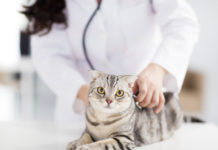Question: My elderly cat has always been healthy, but recently hes developed a black discharge in one ear. On two occasions my veterinarian has examined my cat for the condition, and both times hes cleaned the ear and examined the discharge under a microscope. Im assured that there are no ear mites present. As it would cost me an arm and a leg to keep his ear clean this way, I bought a bottle of ear cleaning medication from my veterinarian so that I could do the dirty work myself. Whats the reason for this discharge? Can it ever be cured?
Answer: The discharge in your cats ear is likely the result of otitis externa (a term which means inflammation of the external ear canal). The external ear canal is an L-shaped tube that extends downward from the outer opening of the ear, makes a sharp 90 degree bend towards the middle of the head, and extends all the way to the eardrum. Your cat apparently isnt experiencing the other common signs of this condition: excessive scratching of the affected ear, frequent shaking of the head, and periodically holding the head sideways with the inflamed ear downward.
Otitis externa is much more common in dogs than it is in cats, probably because canines have a greater tendency to have allergic skin diseases (the lining of the ear canal is skin, after all). The most common cause in cats is infestation with ear mites, arachnid parasites so frequently found in kittens ear canals that, frankly, Im surprised when I dont find them. Adult cats are much less commonly afflicted with ear mites, but its always wise to check for them anyway.
Your veterinarians examination of the ear gook under the microscope should have allowed him to detect ear mites, although sometimes the tiny bugs can only be seen with an otoscope, a lighted device with an attached cone used to examine the ear canal. His microscope should have shown other microbes in the discharge, but sometimes sending a sample to a diagnostic laboratory is necessary to better characterize microscopic organisms associated with the condition. There are numerous types of bacteria, fungi and other kinds of parasites that can infect the skin lining the ear canal, and they can either initiate or perpetuate inflammation. Unlike ear mites, though, these organisms usually arent primary causes; they typically just make things worse.
A Localized Problem or a Generalized One?
Its always wise to look for some underlying problem – either within the ear canal itself or a more generalized systemic problem – thats prompting inflammation or allowing infectious organisms to proliferate. Because just one of your kittys ears has a discharge, Im suspicious of a problem in the canal – perhaps a foreign object (like a blade of grass), a polyp or even a tumor. To rule out such conditions, your veterinarian will have to thoroughly examine the ear canal all the way down to the eardrum. This will require extending the otoscope deep down into the canal and then pointing it inward to see around the corner. Heavy sedation or anesthesia will be absolutely necessary.
If both ears were affected, Id be more apt to consider a generalized problem. There are always exceptions, and either generalized conditions or those strictly limited to the ear canals can cause either one or both ears to be involved. What kinds of generalized conditions should be considered? Allergic skin disease may predispose a cat to otitis externa, but in contrast to dogs, allergic cats almost always have some additional manifestations of skin disease. Disorders that hamper the immune system can permit ear infections, too, so if hes not done so already, your veterinarian should check to make sure your cat isnt infected with feline leukemia virus or feline immunodeficiency virus; infection with either of these viruses can adversely affected immunity. Diabetes mellitus and, less commonly, Cushings disease can lead to skin infections, but it would be very unlikely for your cat to have either of these diseases without their causing obvious and significant problems other than an ear infection.
The outcome of the condition is much more likely to be favorable if you can detect and treat the underlying cause, so I dont recommend simply settling for periodic ear cleaning to try to keep things under control. Plus, some of the common ear medications/cleaners may actually induce inflammation in some cats, so cleaning might make things even worse.



